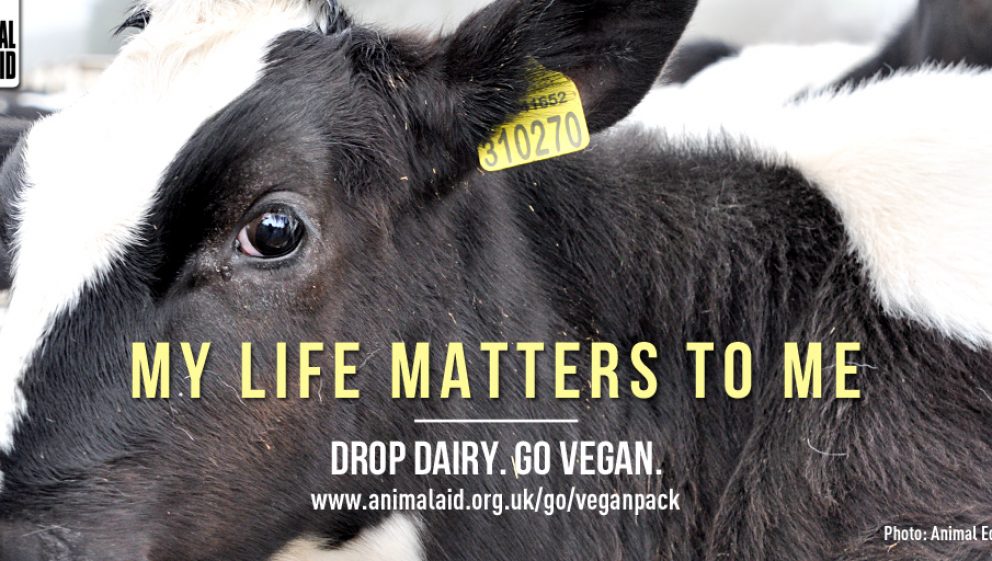Photo credit: Animal Equality
- You’re drinking pus
An udder infection called mastitis is very common in dairy cows and causes pus to leach into milk. Because dairy milk is pooled together in large tanks, virtually all dairy milk contains this pus. A litre of milk can have up to 400,000,000 somatic cells (pus cells) before it is considered unfit for people to drink.
- Cows are producing more milk than ever
The amount of milk produced by each cow in the UK has increased by more than 13 per cent in the last ten years to levels far beyond what is natural. This puts the cows under ever greater stress as their bodies try to keep up with the physical demands of producing so much milk.
- Many cows never see grass
Almost all dairy cows are kept in sheds for six months of the year, even those covered by the ‘Free Range Pasture Promise’, but more and more cows are being kept indoors permanently. As much as 20 per cent of British milk now comes from zero-grazing farms where cows are kept in barren, featureless sheds all year round.
- More soya is used to make dairy milk than soya milk
Dairy cows now produce so much milk that even many of those who are allowed to graze can no longer get enough nutrients from grass alone, so they are also fed grain, soya and other crops. In fact, around ten times as much soya is fed to British dairy cows each year than is used to make all the soya milk currently consumed in the UK in 12 months.
- Dairy farms are polluting rivers…
According to the Environment Agency, dairy farms are responsible for far more water pollution incidents than any other form of farming. Slurry from dairy farms leaks into rivers and streams where it kills fish and spreads disease.
- …and wasting water
As well as polluting water, dairy farms use huge quantities of this precious resource. The amount of fresh water needed to create a litre of British cow’s milk is almost twice as much as is needed to make a litre of soya milk. For most other countries, the difference is even bigger.
- Veal is still a thing
Many people believe that veal – the meat of young dairy calves – has been banned, but around 5,400 tonnes of veal are still produced in the UK each year. Veal only exists because dairy cows must be made pregnant every year in order to produce milk, which results in a calf being born. Calves, especially males, are often unwanted by farmers so they are usually sold on and slaughtered at just a few months old for veal. Thousands are even shot at birth.
- Cows are killed for dairy
Most people think milk is perfectly harmless because cows aren’t slaughtered to produce it, but they are. After five or six years of repeatedly being impregnated and forced to produce abnormally large quantities of milk, most dairy cows are left exhausted and unable to keep up with demands made of them, so they are sent to the slaughterhouse to be killed for cheap meat. The natural lifespan of a cow can be more than twenty years.
- Milk is warming the planet
Methane and nitrous oxide are powerful greenhouse gases far stronger than carbon dioxide and are produced in huge quantities by dairy cows and their slurry. The equivalent of around four per cent of all greenhouse gas emissions are thought to come from dairy farming, with the carbon footprint of cow’s milk being about twice as large as that of soya milk.
- There are better sources of calcium
Milk is often promoted as an excellent source of calcium, but there are plenty of plant-based foods that contain as much or far more of this essential nutrient. Weight-for-weight, tofu has about the same calcium content as milk; dried figs contain 35 per cent more calcium; almonds provide more than twice as much calcium as cow’s milk; and sesame seeds contain more than eight times as much.
For information about dairy-free alternatives to milk, cheese, butter, yogurt and more, please order one of our FREE Go Vegan Packs.
Order a FREE Go Vegan Pack


